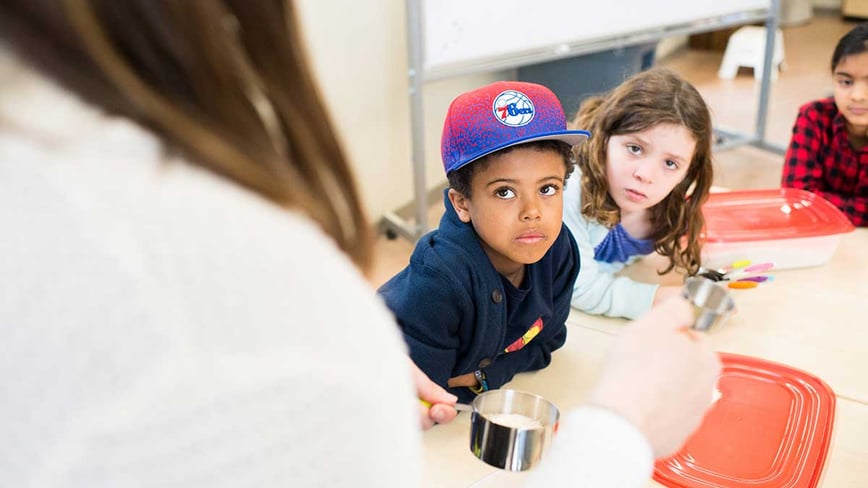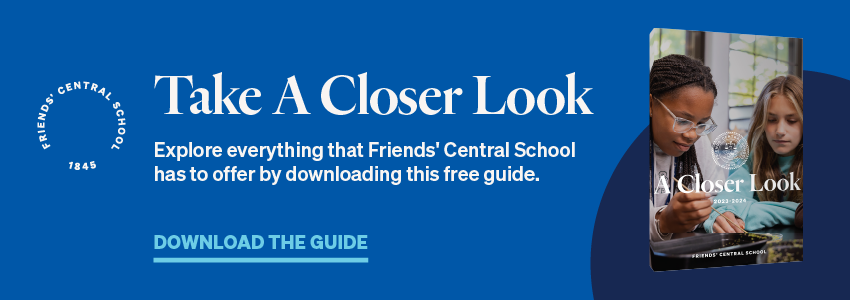
When it comes to finding the right private or independent school for your child, you want to make sure that the school you choose is going to be the one that helps your child develop into the person that you want them to become.
While test scores and admissions results are, of course, important considerations, parents do their children a disservice by focusing solely on academic aspects of their child’s education. After all, a high-quality education is about more than performing well on tests. It’s about nurturing qualities in your child that will help them to become caring citizens who are capable to being truly successful in all that they do.
Free Downloadable Guide: Take a Closer Look at Friends' Central School
One educational philosophy that fosters both this academic and personal growth is Maker Education, which focuses on cross-disciplinary, hands-on learning. The academic benefits of this are obvious, and tie in closely to STEM, but it’s often easy to overlook some of the non-academic benefits that the Maker movement can instill in children. We explore those benefits below.
1. Creativity
It may seem strange to speak about creativity as a skill which must be nurtured and taught—after all, children are born with creative minds, aren’t they? While it’s true that children are often inherently creative, it’s important to realize that if creativity is not nurtured, encouraged, and prioritized, it is a skill that can very easily be lost.
There are a lot of ways that parents and teachers can encourage creativity in their children, and the Maker Movement/Maker Education can help.
Though Maker programs vary from school to school and between grade levels, one thing that is consistent between all programs is the fact that they prioritize hands-on, experiential learning.
By encouraging children to learn by doing—as opposed to simply learning by reading or by listening to a lecture—Maker Ed allows kids to flex their creative muscles and get better at focusing their creative energy to solve a problem. While creativity for creativity’s sake is great, being able to focus creative energy to solve a problem is a very important skill for everyone, child or adult, to learn.
2. Critical Thinking
Critical thinking—the ability to look at something objectively in order to form an opinion or plan of action—is often thought of as being similar to creativity. But while they are related skills, they are, in fact, also very different. Creativity is a person’s ability to use their imagination; critical thinking is the ability to look at a problem or issue and form a judgement about it.
In other words, creativity is the ability to look at something in a new way and to think outside of the box; but actually using that creativity to solve a problem efficiently and effectively requires critical thinking.
Critical thinking skills are some of the most important for any child to learn, as it can impact everything from academic performance to career trajectory and even how someone performs in an emergency situation.
Typically, a Maker Education program will work by presenting a problem to a child and asking them to solve it. To do so, the child will need to evaluate the problem critically and determine the best course of action. Sometimes, the problem will require extreme creativity to solve; other times, a more straightforward or obvious solution may work perfectly fine. It is up to the child (with guidance from an instructor) to determine which course of action is most appropriate, and then to test that determination for themselves.
In doing so, the child is able to practice their critical thinking, flex their muscles, and learn from the experience.
3. Self-Confidence
Self-confidence—a sense of trust in your own abilities and skills—is an extremely important quality for all children to build. Without self-confidence, children are often plagued by a fear of failure, which can limit their willingness to pursue risk and put themselves out there to try something new. And this can have a negative impact on many aspects of their life, from academics to career to relationships.
Self-confidence is built when a child is presented with a challenge and experiences success. That success reinforces the idea, in their own mind, that they are capable, and that they can rely on themselves.
So, how can a parent help build their child’s self-confidence? That all depends on the kind of self-confidence that needs to be built. Sports can be great to build physical self-confidence, and group activities like Scouting, Drama Club, and Band can be great to build social self-confidence. But what about academic self-confidence?
That’s where Maker Ed comes into play. By presenting a child with a challenge and supporting them as they work to solve it on their own, Maker Education teaches children that they are capable of succeeding academically.
Not Just Academics
When evaluating which school to enroll your child in, the academic record of the school will of course play a major role in your final decision. MakerEd aims to bridge the divide between vocation, academics, and soft skills. Long after your child has forgotten their test scores, they’ll remember the lessons that taught them to be engaged learners and citizens—lessons taught exceptionally well by the Maker movement and Maker Ed.



